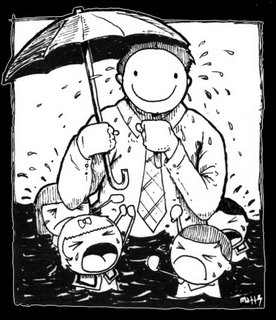Returning Japanese

(Part 1)
The students at Kashishi Jr. High School decided I needed to cry. They were not alone in this. A good portion of my town of Toyotama, on the remote Japanese island of Tsushima where I lived and worked as an English teacher for two years, was conspiring to tear-jerk me. Perhaps part of the reason was that they had not yet seen me cry, despite what they must have considered to be ample opportunity. We often think of the Japanese as rather cold, with upper lips as stiff as samurai steel, but even the manliest man's men are reduced to blubbering in the proper setting, like graduations and good-bye parties for departing teachers. And though I was sad to say "sayonara" to students and teachers I'd befriended, my eyes always remained dry at such events.
I am, after all, an American male, and that means I am by law only allowed to cry at loved ones' funerals, when dogs die, and during cheesy, inspirational sports movies when everyone begins to slow-clap. Even had I gotten teary, there'd be no competing with the overflow of emotion around me. Being an American at a Japanese good-bye party is like being a robot in the midst of an Italian funeral.
So, Osutein-sensei had to cry. I was leaving after two years. Crying was simply called for. I nearly broke at my elementary school good-bye ceremonies, when all the adorable students I'd come to think of as my little Japanese sisters and brothers gave me hand-made gifts and messages. I held strong, though. Toyotama Elementary School would have succeeded in making my tear-ducts flow had they not used a computer to translate the big banners they made into English, "It Returns to America and It Is Not Forgetting of Enjoy Memories and We Tell It Come Back." Never before has being reduced to an anonymous, genderless pronoun been so profound.
At Kashishi, though, they had an ace up their sailor suit sleeves. While I greatly enjoyed teaching at all my schools, Kashishi was special. From my first day there, the staff and students had welcomed me and made me feel that I belonged there. They had treated me, in other words, not as the mysterious outlander, but as one of them. A lot of this was thanks to the English teachers, a woman with the wonderfully unfortunate name of Saiko (pronounced "psycho") and her eventual replacement, Mayumi, both of whom made me feel like I belonged. For an expatriate, especially in Japan, where I always stuck out like a white-skinned thumb, finding such a place is sanity-saving.
Which is all the more remarkable considering that Kashishi is a small squid fishing village at the dizzy fringes of the earth. Even in my town of 4,000 people, it was considered remote and backwards. But I belonged there, in my own strange way. It was like my Cheers, where everyone knows (or at least tries to correctly pronounce) your name. So they didn't have to try so hard to make me cry when I left, though try hard they did.
As I found out later from Mayumi, the students had gathered in secret and plotted their tear-summoning masterpiece. They took my favorite karaoke song, John Denver's "Take Me Home, Country Roads," and rewrote the lyrics to be about Tsushima. And they practiced into the long dark hours of the night (or so I like to imagine), trying to get it right. A delicate process, as one girl named Nagisa realized. "We have to sing it cheerfully," she told the others, "but not too cheerfully, since he's leaving."
Thus, it was that during my farewell ceremony in the gym, my students gathered in a semi-circle around me and sang their new version of "Country Roads" at the top of their lungs. When they hit the line "country roads, take me home, to the place I belong..." their conspiracy was realized and I broke.
I never would have imagined that leaving Tsushima would leave me empty. After all, it's about as far from my familiar world as I could get geographically, culturally, linguistically, and culinarily. But it was home for two years—home in every way a place can be. I've come to find that home is a fluid concept, it shifts and changes like tidal sand. Language and culture are important but home, simply put, is where you belong. And that can be damn near anywhere. One's man hinterland is another man's home.
People keep asking me how it feels to be back "home" in America. I smile and reply politely, but I can't really answer that question. Soon enough the States will feel like home again, but for right now the word "home" doesn't mean America, it means that little island on the other side of the ocean. There's no place like home.
Labels: Master Matt, Osutein-Sensei


1 Comments:
i wish i could say it happened a great deal further in the past than it did but I got all tear-y eyed just last night watching Lost. "I'm sorry i forgot the blankets!" sorry indeed.
but I'm a man dammit! *scratches self* *pops tab on can of beer* *hears co-worker exclaim: "good lord man its only 10 after 9 in the morning!"*
Post a Comment
<< Home